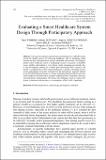Files in this item
Evaluating a smart healthcare system design through participatory approach
Item metadata
| dc.contributor.author | Webber, Thais | |
| dc.contributor.author | Kuster Filipe Bowles, Juliana | |
| dc.contributor.author | Constantinides, Argyris | |
| dc.contributor.author | Belk, Marios | |
| dc.contributor.author | Morley, Emma | |
| dc.contributor.editor | Mantas, John | |
| dc.contributor.editor | Gallos, Parisis | |
| dc.contributor.editor | Zoulias, Emmanouil | |
| dc.contributor.editor | Hasman, Arie | |
| dc.contributor.editor | Househ, Mowafa S. | |
| dc.contributor.editor | Diomidous, Marianna | |
| dc.contributor.editor | Liaskos, Joseph | |
| dc.contributor.editor | Charalampidou, Martha | |
| dc.date.accessioned | 2022-07-05T15:30:17Z | |
| dc.date.available | 2022-07-05T15:30:17Z | |
| dc.date.issued | 2022-07-01 | |
| dc.identifier | 279738288 | |
| dc.identifier | c93257df-9103-44b7-8561-937ed51c513a | |
| dc.identifier | 85133243066 | |
| dc.identifier.citation | Webber , T , Kuster Filipe Bowles , J , Constantinides , A , Belk , M & Morley , E 2022 , Evaluating a smart healthcare system design through participatory approach . in J Mantas , P Gallos , E Zoulias , A Hasman , M S Househ , M Diomidous , J Liaskos & M Charalampidou (eds) , Advances in Informatics, Management and Technology in Healthcare . vol. 295 , 90 , Studies in Health Technology and Informatics , vol. 295 , IOS Press , Amsterdam , pp. 312-315 , 20th International Conference on Informatics, Management, and Technology in Healthcare (ICIMTH 2022) , Athens , Greece , 1/07/22 . https://doi.org/10.3233/SHTI220725 | en |
| dc.identifier.citation | conference | en |
| dc.identifier.isbn | 9781643682907 | |
| dc.identifier.isbn | 9781643682914 | |
| dc.identifier.issn | 0926-9630 | |
| dc.identifier.other | ORCID: /0000-0002-8091-6021/work/115631144 | |
| dc.identifier.other | ORCID: /0000-0002-5918-9114/work/115631247 | |
| dc.identifier.uri | https://hdl.handle.net/10023/25609 | |
| dc.description | This research is funded by the EU H2020 project SERUMS (grant 826278). We thank all project partners for contributions on the overall system development and PoC system design and evaluation. | en |
| dc.description.abstract | Advances in computer communication technology have enabled the rapid growth of e-health services for delivering healthcare, such as facilitating online consent and data sharing between patients and health professionals. Developing a patient-centric healthcare system is challenging because by necessity, it should be secure, reliable, and resilient to cyber threats, whilst remaining user-friendly. Key to any development aiming for a refined proof-of-concept (PoC) system is the pursuit of comprehensive public system testing and evaluation. This paper focuses on the methodology and results obtained from the participatory approach adopted by the EU H2020 project Serums to evaluate and demonstrate the effectiveness of a smart healthcare system based on emergent technologies like blockchain, data lake, and multi-factor authentication. We discuss the challenges faced by remote PoC system evaluations with end-users as a consequence of the Covid-19 pandemic. | |
| dc.format.extent | 4 | |
| dc.format.extent | 234145 | |
| dc.language.iso | eng | |
| dc.publisher | IOS Press | |
| dc.relation.ispartof | Advances in Informatics, Management and Technology in Healthcare | en |
| dc.relation.ispartofseries | Studies in Health Technology and Informatics | en |
| dc.subject | Healthcare provision | en |
| dc.subject | System design | en |
| dc.subject | Participatory evaluation | en |
| dc.subject | QA75 Electronic computers. Computer science | en |
| dc.subject | RA Public aspects of medicine | en |
| dc.subject | NS | en |
| dc.subject.lcc | QA75 | en |
| dc.subject.lcc | RA | en |
| dc.title | Evaluating a smart healthcare system design through participatory approach | en |
| dc.type | Conference item | en |
| dc.contributor.sponsor | European Commission | en |
| dc.contributor.institution | University of St Andrews. School of Computer Science | en |
| dc.identifier.doi | https://doi.org/10.3233/SHTI220725 | |
| dc.identifier.grantnumber | SEP-210512424 | en |
This item appears in the following Collection(s)
Items in the St Andrews Research Repository are protected by copyright, with all rights reserved, unless otherwise indicated.

